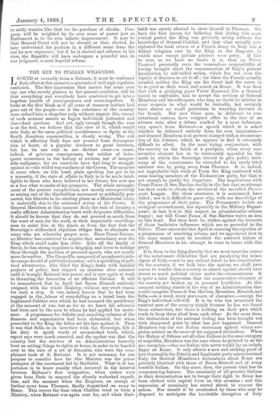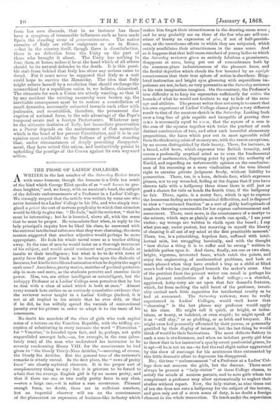THE KEY TO ITALIAN WEAKNESS.
T COKED at cursorily from a distance, it must be confessed J Italy offers at this moment a spectacle of well nigh repulsive confusion. The first impression that cannot but come over any one who merely glances at her present condition, will be that everything and everybody have contrived to get into a hopeless jumble of cross-purposes and cross-impulses. It looks at the first blush as if all sense of common instinct had gone out of the people—as if the substance of the country were reducd into a shapeless pulp without organic life, except of such noxious nature as begets individual jealousies and discordant passions. And yet, ugly enough though the case is at the best, we believe that this view of it, which would rate Italy at the same political worthlessness as Spain or the South American communities, is clearly wrong. The evil which is affecting Italy does not proceed from decomposi- tion at heart, or a popular deadness to great interests, but has its one root in one distinct cause—a cause, indeed, of grievous consequences, but neither of infre- quent occurrence in the history of nations, nor of insuper- able maligancy, for we ourselves have had long to struggle against it—the wilful waywardness of the Crown. The moment is come when, on this head, plain speaking has got to be a necessity, if the state of affairs in Italy is to be made intel- ligible to those who have believed in her future, but now are at a loss what to make of her prospects. The whole entangle- ment of the present complication, not merely retrospectively as arising out of the Garibaldian movement so artificially pro- moted, but likewise in its existing phase as a Ministerial crisis, is materially due to the untoward action of the Crown. If General Menabrea at this moment finds the task of forming a really efficient Administration beset with desperate difficulties, it should be known that they do not proceed so much from the want of men for the work, or their unpatriotic unwilling- ness to assist him at the pinch, as from the fact that the Sovereign's stiffnecked objection obliges him to eliminate so many who are otherwise proper men. Since Count Cavour, no Minister has contrived to acquire that ascendancy over the King which could make him defer. Like all the family of Savoy, he has strong impulses to kingship, and loves to indulge them through the medium of personal agents, who are mostly mere favourites. The Camerilla, composed of sycophantic aide- de-camps devoid of political education, with a sprinkling of poli- tical adventurers, who filled the King's brain with fanciful projects of policy, had tripped up minister after minister until it brought Rattazzi into power, and is now again at work in thwarting the formation of an efficient Cabinet. It will be remembered that in April last Baron Ricasoli suddenly resigned, with his whole Ministry, without any overt reason for such a step. It was, indeed, known that he had been engaged in the,labour of remodelling on a broad basis the haphazard Cabinet over which he had assumed the presidency at the moment of war, but as far as we know his advances had been met by the men to whom he had applied for assist- ance. A programme for definite and searching reforms of the finances and organization had been elaborated, but when presented to the King the latter set his face against it. Then it was that Sella, in an interview with the Sovereign, felt it his duty to speak words of unvarnished truth, which, report says were much resented, and the upshot was that the country lost the services of an Administration honestly bent on setting things to rights at home, in order to be handed over to the care of a set of dummies, who were the com- plaisant tools of S. Rattazzi. It is not necessary for our purpose to consider how far this Minister was the prime prompter of the movement led by Garibaldi. What is of im- portance is to know exactly what occurred in the interval between Rattazzi's first resignation, when orders were given from Paris to suspend the already embarked expedi- tion, and the moment when the Emperor, on receipt of further news from Florence, finally despatched an army to Rome. This covers the time when Cialdini tried to form a Ministry, when Rattazzi was again sent for, and when Gari- baldi was openly allowed to show himself in Florence. We have the best reason for believing that during this most critical period the King was privately acting without the knowledge of General Cialdini, and that what actually pre- cipitated the fatal return of a French Army to Italy was a defiant telegram sent by the King to the Emperor, to which none except private advisers were privy. If this be true, as we have no doubt it is, then on Victor Emanuel personally rests the tremendous responsibility of having brought about the consummation of Italy's present humiliation by self-willed action, which has not even the dignity of firmness to set it off ; for when the French actually invaded, neither the King nor his Court had the nerve to be as good as their word, and march on Rome. It was then that with a grudging grace Victor Emanuel, like a General forced to capitulate, had to accept the services of General Menabrea and his colleagues, who may no doubt be inferior in some respects to what would be desirable, but certainly have shown no small patriotism in standing forward in the breach. But now these men, in' deference to con- stitutional custom, have resigned office in the face of an adverse vote, after a debate marked by a most inflamma- tory speech from Rattazzi—a speech which it is asked, whether he delivered entirely from his own inspiration— and General Menabrea is at present charged with a reconstruc- tion of his Cabinet., which he appears to find it extremely difficult to effect. In the most trying conjuncture, with the country on the brink of a precipice, when every con- servative element has to be strenuously appealed to, the mode in which the Sovereign elected to give public testi- mony of the countenance he extended to his sorely tried minister was by going away from Florence. It is, indeed, not improbable that while at Turin the King conferred with some leading members of the Piedmontese party, but that is not enough to justify his departure. The negotiations with Count Ponza di San Martino testify to the fact that an attempt has been made to obtain the services of the so-called Perm- nente League. But these overtures, it is announced, have failed ; nor is it difficult to guess why, with our knowledge of the programme of their party. The Permanente insists on stringent retrenchment, but especially in the Military Depart- ment; in fact, it is in this respect an administrative reform league ; nor will Count Ponza di San Martino waive an iota on this head. But then here he strikes against the interests of those backstairs influences which are so powerful in the Palace. These succeeded last April in ensuring the rejection of a programme of searching reform, and we apprehend that to the same causes must be ascribed the renewed failure of General Menabrea in his attempt to come to terms with this party.
It is, then, to the King directly that we must trace the source- of the unfortunate difficulties that are paralyzing the infant vigour of Italy,—not to any radical defect in her constitution. On the contrary, if we look into the matter, we shall have reason to wonder that a country so sinned against should have shown so much political virtue under the circumstances. It is quite a false impression that the conservative elements of the country are broken up in personal hostilities. At this moment nothing stands in the way of an Administration that would comprise Ponza di San Martino, Menabrea, Ricasoli, and Sella, in a word, every statesman of character,—except the King's individual self-will. It is he who has ostracized the eminent men of the country simply because he has not found them subservient, but there is nothing on their part which tends to keep them aloof from each other. At the same time, the distinctness of the national feeling has been brought out with sharpened point by what has just happened. General Menabrea was the one Italian statesman against whom sus- picion existed on the score of his supposed clericalism. When the Bishop of Orleans set all other Italians in the same category of ungodlies, Menabrea was the man whom he pointed to as the one exception,—the one Italian who never would lay an unholy finger on Rome. It only affords a new and striking proof of how thoroughly the Priestly and Legitimist party misunderstand Italy, for General Menabrea's declarations about Rome are precisely identical with those of Baron Ricasoli and of every sensible Italian. On this score, then, the present trial has its compensating feature. The unanimity of all genuine Italians in their determination not to forego their right to Rome has been elicited with capital force on this occasion ; and this expression of unanimity has served afresh to cement the nation. Nor should it be overlooked by those who may be disposed to anticipate the inevitable disruption of Italy from her own discords, that in no instance has there been a symptom of treasonable influences such as have made Spain the standing scene of pronuncietmentos. The native enemies of Italy are either emigrants or are in Rome, —but in the country itself, though there is dissatisfaction, there is no defection from the Unity on the part of those who brought it about. The Unity has nothing to fear, then, at home, unless it be at the hand which of all others should be its natural defender to the death. It is this possi- ble stab from behind that Italy has alone any serious cause to dread. For it must never be supposed that Italy as a unit could hope to survive the Monarchy. The idea that Italy might relieve herself by a revolution that should exchange the monarchical for a republican union is, we believe, chimerical. The elements for such a Union are utterly wanting, so that if by any accident the existing monarchy were broken up, the inevitable consequence must be to restore a constellation of small dynasties, necessarily animated towards each other with jealousies, and re-establish, therefore, the permanent dis- ruption of national force, to the sole advantage of the Pope's temporal estate and a foreign Protectorate. Whatever may be the ultimate destinies of Italy, her immediate preservation as a Power depends on the maintenance of that monarchy which is the bond of her present Constitution, and it is in our opinion most creditable to the Italians of political standing that, under circumstances of deeply provoking disappoint- ment, they have seized this axiom, and instinctively persist in upholding the prestige of the Crown against its own wayward action.









































 Previous page
Previous page